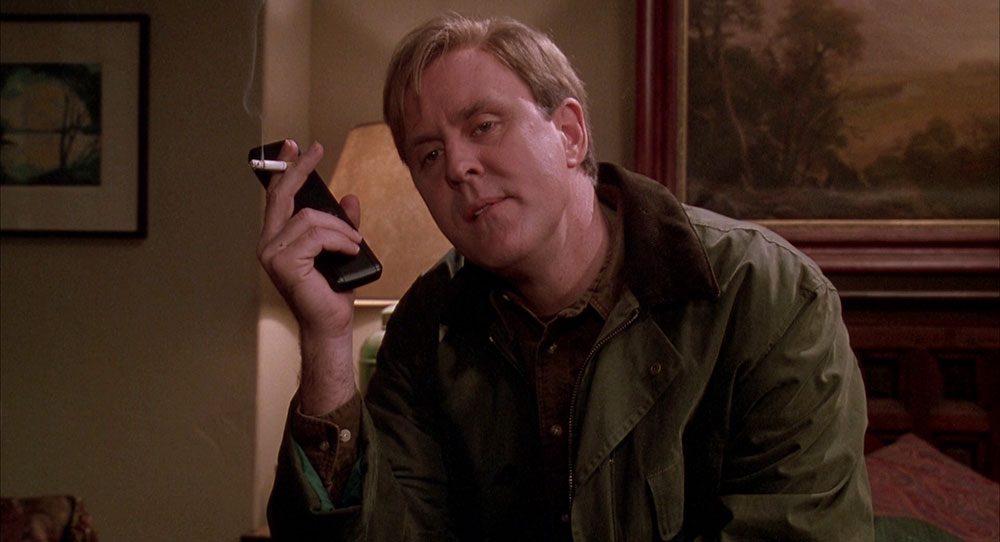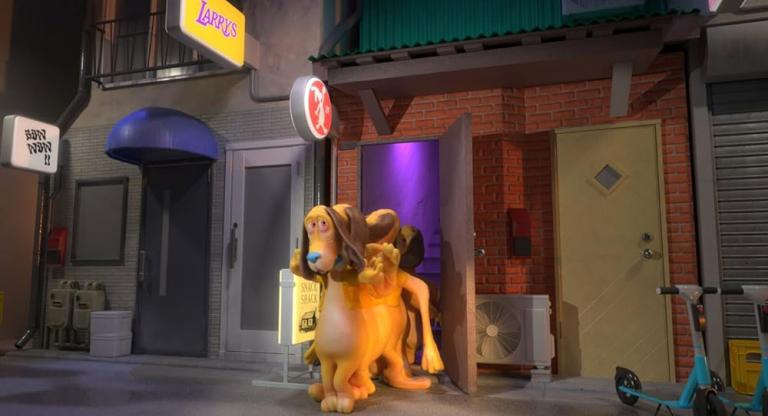In her review of Body Double (1984), noted Brian De Palma fan Pauline Kael lambasted De Palma’s latest film for merely, emptily doing De Palma: “the voyeuristic themes and the scare sequences are so similar to elements of his earlier movies that you keep waiting for the thrills—the moments when he’ll top himself. And he doesn’t. He doesn’t equal himself, either.” Coming on the heels of prominent failure The Bonfire of the Vanities (1990) and widely considered likewise a minor work, Raising Cain (1992) represents a further and fairly literal return to form: to nonlinear self-satire complete with operatic slow-motion, soft-focus sex, and frame-fracturing split screens—maybe his most iconic authorial signature, absurdly fitting for a story about the violent compartmentalization of dissociative identity disorder.
John Lithgow is the child psychologist Carter Nix, a hands-on dad whom we meet waiting at the playground for a pick-up from his wife, Jenny (Lolita Davidovich). But Lithgow also plays Carter’s leering criminal brother Cain and their aged father, the discredited Norwegian psychologist Dr. Nix Sr., whose controversial experiments in early childhood development are both the film’s backstory and its primary source of suspense. With Cain’s help, Carter is recruiting (kidnapping) children to act as test subjects for a second experimental trial aimed at resuming/redeeming his father’s opus. Meanwhile, Jenny navigates her own past-cum-present predicament: an abruptly rekindled affair with the widower of a former terminal patient. Everyone is a doctor, everyone wears a trench coat. Repetition inheres not only to Raising Cain’s recursive narrative, which jettisons chronology for something like concentric circles—we see things, we discover their context, we revisit for emphasis—but also to the mise-en-scène: in one sequence, Jenny prepares and confuses identically wrapped gifts for her husband and for her lover; in another, Nix Sr.’s estranged co-author, Dr. Waldheim (Frances Sternhagen), is steered around indistinguishable corners and intersections of the labyrinthine police station to farcical effect.
If elsewhere De Palma’s flair for doubling conjures Hitchcock’s Vertigo (1958), Raising Cain is a mutation of Psycho’s (1960) DNA—similarly teetering between gross spectacle and flat exposition, and obsessed with submergence, down to the inclusion (and eventual resurfacing!) of a slowly drowned car. At worst, it’s an incoherent experiment in plotline convergence. At best, it’s an unlikely grandstand for the singular, batty elegance of John Lithgow; in his Carter/Cain/father and beyond, you can glimpse the Fulbright-funded drama student who simulated madness to evade the Vietnam draft. In his resumed collaboration with Lithgow—co-star of Obsession (1976)—De Palma discovers something special, if not strictly new. It’s as Cain (or Carter?) says to flirty babysitter Nan (Gabrielle Carteris), validating her curiosity: “It's not the mileage, honey. It's the make.”
Raising Cain screens tonight, November 29, in 35mm at Nitehawk Prospect Park as part of the series “Ridiculous <> Sublime.”



